Unit 4 Don’t eat in class 单元复习课件(共39张PPT)
文档属性
| 名称 | Unit 4 Don’t eat in class 单元复习课件(共39张PPT) | 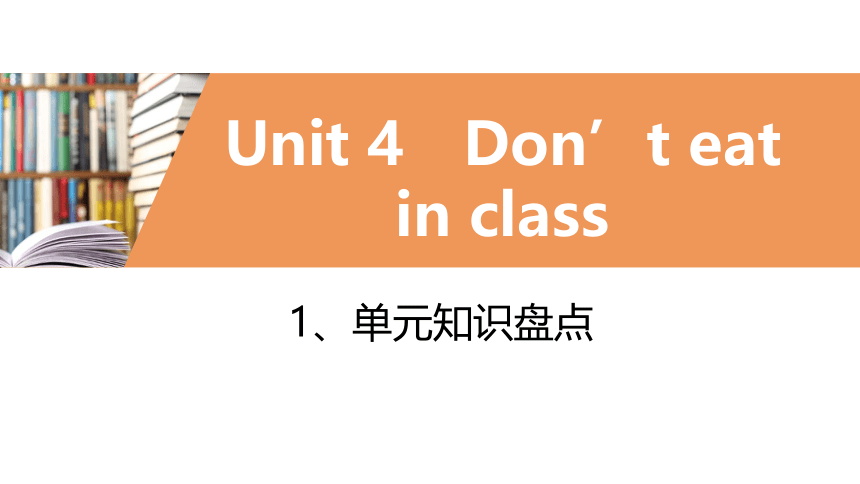 | |
| 格式 | pptx | ||
| 文件大小 | 359.5KB | ||
| 资源类型 | 教案 | ||
| 版本资源 | 人教新目标(Go for it)版 | ||
| 科目 | 英语 | ||
| 更新时间 | 2022-08-05 19:57:24 | ||
图片预览

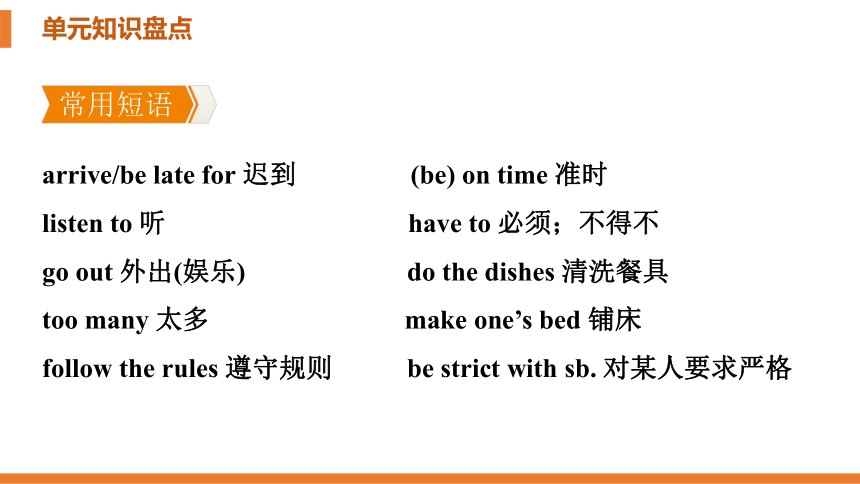
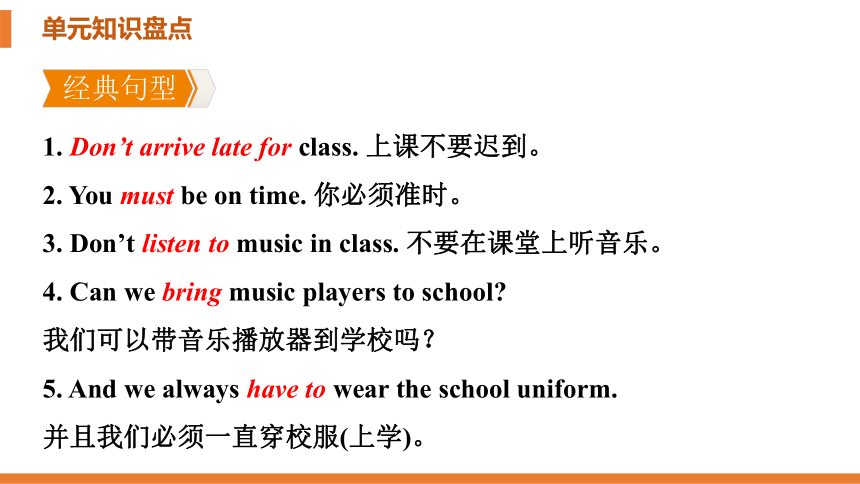
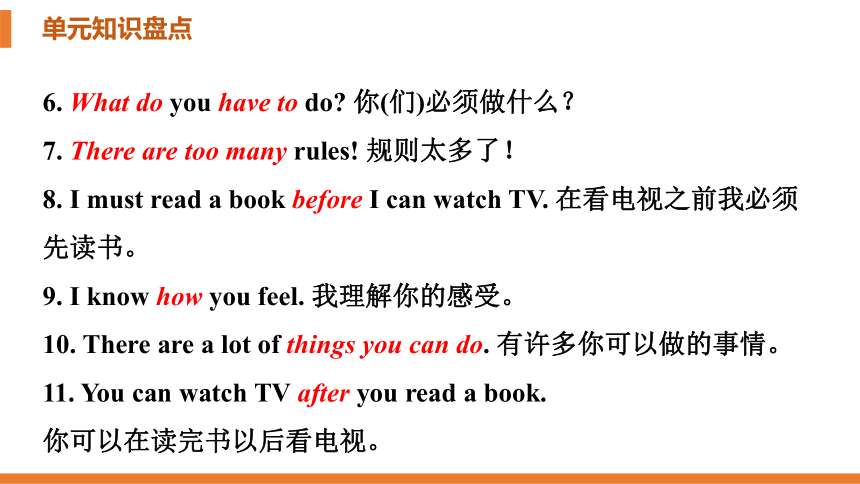
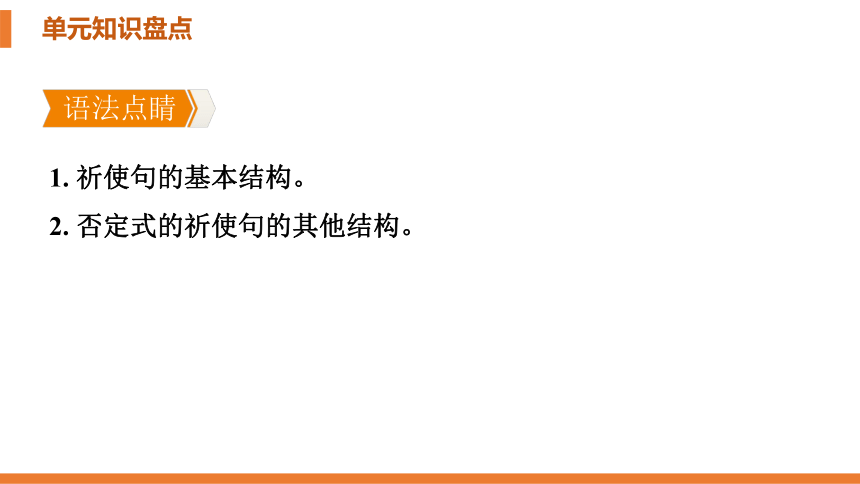
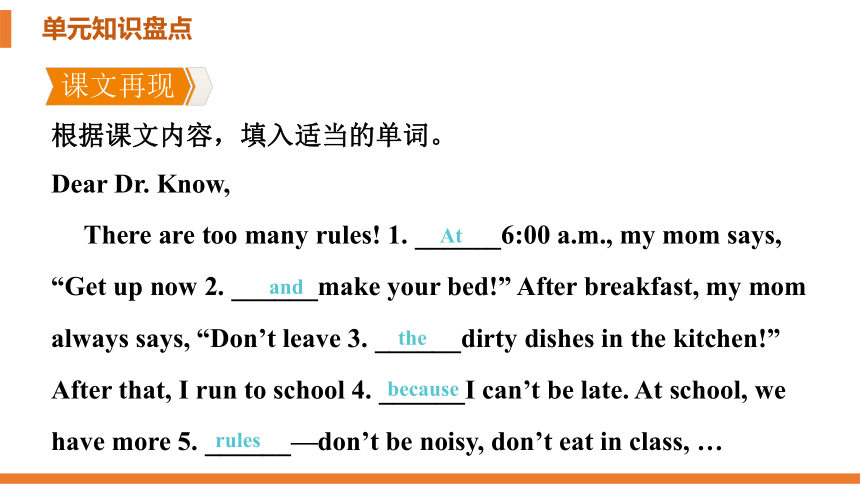
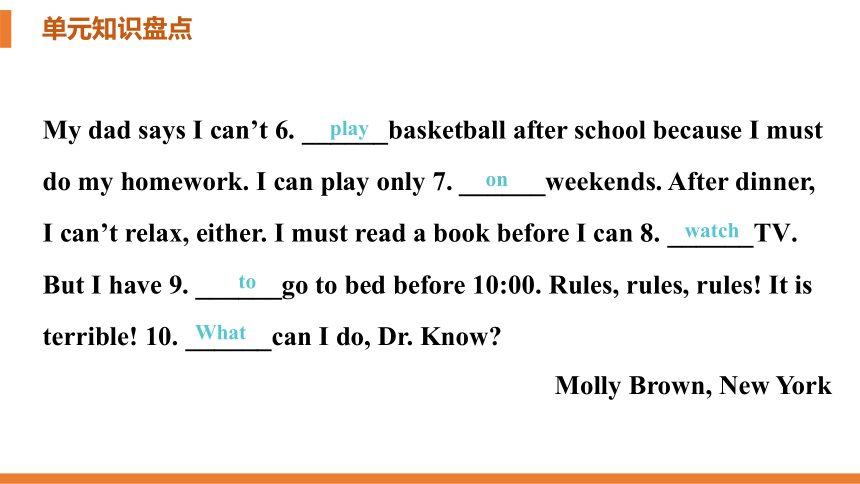
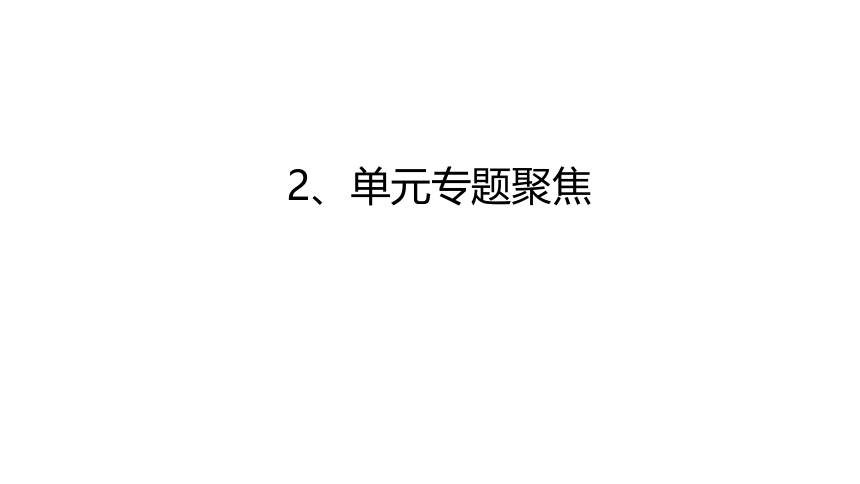
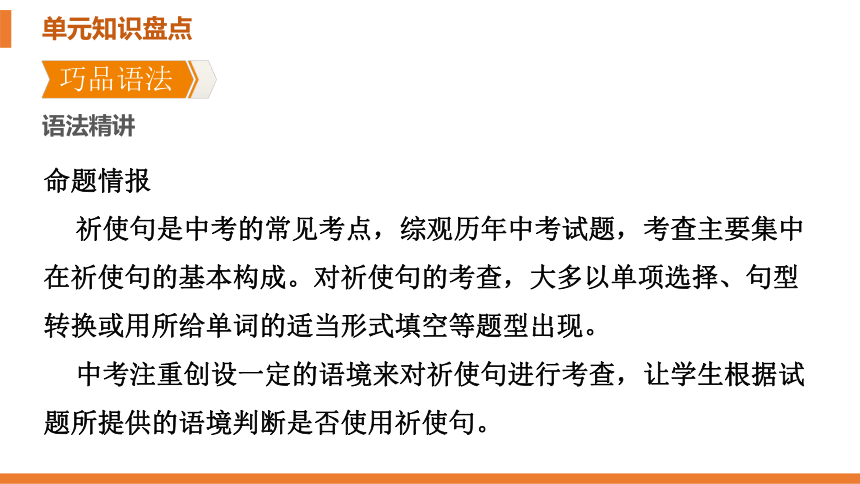
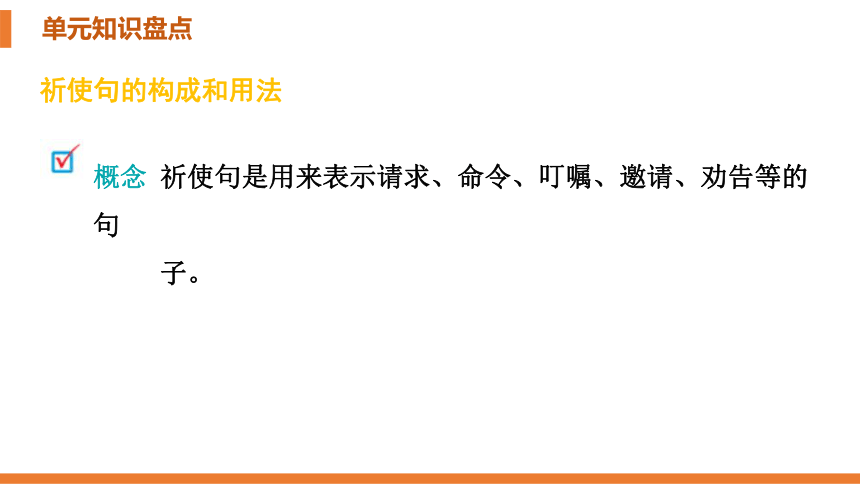
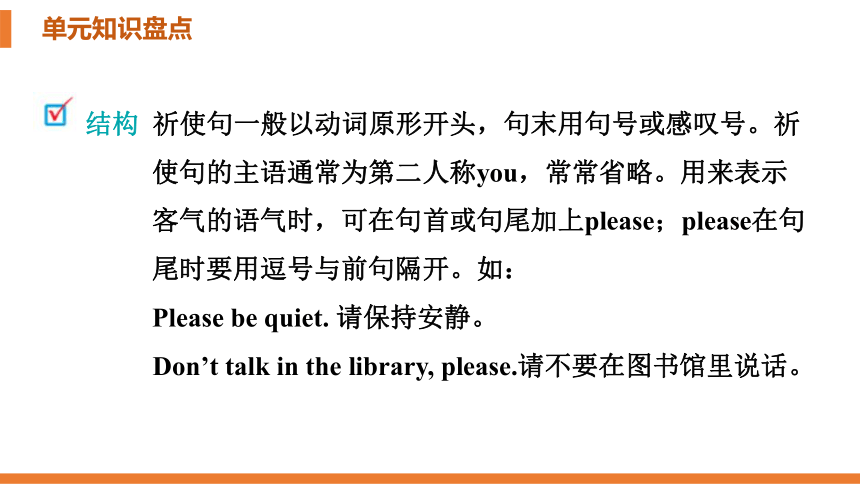
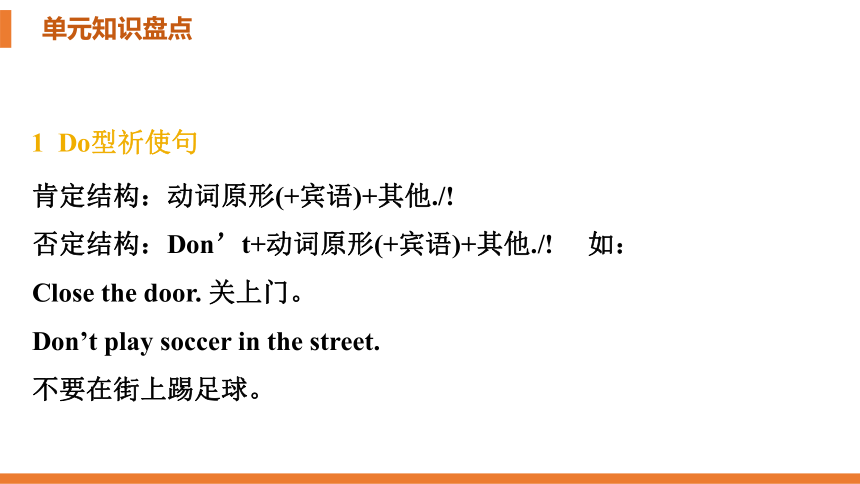
文档简介
(共39张PPT)
Unit 4 Don’t eat in class
1、单元知识盘点
常用短语
arrive/be late for 迟到 (be) on time 准时
listen to 听 have to 必须;不得不
go out 外出(娱乐) do the dishes 清洗餐具
too many 太多 make one’s bed 铺床
follow the rules 遵守规则 be strict with sb. 对某人要求严格
经典句型
1. Don’t arrive late for class. 上课不要迟到。
2. You must be on time. 你必须准时。
3. Don’t listen to music in class. 不要在课堂上听音乐。
4. Can we bring music players to school
我们可以带音乐播放器到学校吗?
5. And we always have to wear the school uniform.
并且我们必须一直穿校服(上学)。
6. What do you have to do 你(们)必须做什么?
7. There are too many rules! 规则太多了!
8. I must read a book before I can watch TV. 在看电视之前我必须先读书。
9. I know how you feel. 我理解你的感受。
10. There are a lot of things you can do. 有许多你可以做的事情。
11. You can watch TV after you read a book.
你可以在读完书以后看电视。
语法点睛
1. 祈使句的基本结构。
2. 否定式的祈使句的其他结构。
课文再现
根据课文内容,填入适当的单词。
Dear Dr. Know,
There are too many rules! 1. ______6:00 a.m., my mom says, “Get up now 2. ______make your bed!” After breakfast, my mom always says, “Don’t leave 3. ______dirty dishes in the kitchen!” After that, I run to school 4. ______I can’t be late. At school, we have more 5. ______—don’t be noisy, don’t eat in class, …
At
and
the
because
rules
My dad says I can’t 6. ______basketball after school because I must do my homework. I can play only 7. ______weekends. After dinner, I can’t relax, either. I must read a book before I can 8. ______TV. But I have 9. ______go to bed before 10:00. Rules, rules, rules! It is terrible! 10. ______can I do, Dr. Know
Molly Brown, New York
play
on
watch
to
What
2、单元专题聚焦
巧品语法
语法精讲
命题情报
祈使句是中考的常见考点,综观历年中考试题,考查主要集中在祈使句的基本构成。对祈使句的考查,大多以单项选择、句型转换或用所给单词的适当形式填空等题型出现。
中考注重创设一定的语境来对祈使句进行考查,让学生根据试题所提供的语境判断是否使用祈使句。
祈使句的构成和用法
概念 祈使句是用来表示请求、命令、叮嘱、邀请、劝告等的句
子。
结构 祈使句一般以动词原形开头,句末用句号或感叹号。祈
使句的主语通常为第二人称you,常常省略。用来表示
客气的语气时,可在句首或句尾加上please;please在句
尾时要用逗号与前句隔开。如:
Please be quiet. 请保持安静。
Don’t talk in the library, please.请不要在图书馆里说话。
1 Do型祈使句
肯定结构:动词原形(+宾语)+其他./!
否定结构:Don’t+动词原形(+宾语)+其他./! 如:
Close the door. 关上门。
Don’t play soccer in the street.
不要在街上踢足球。
2 Be型祈使句
肯定结构:Be+表语+其他./!
否定结构:Don’t+be+表语+其他./! 如:
Be careful next time! 下次要细心!
Don’t be late for school! 上学不要迟到!
3 Let型祈使句
肯定结构:Let+宾语+动词原形+其他./!
否定结构:Don’t +let+宾语+动词原形+其他./!
Let’s+not+动词原形+其他./! 如:
Let’s have a rest. 咱们休息一下吧。
Don’t let him go swimming. 不要让他去游泳。
4 否定式的祈使句的其他结构
1.“No+v.-ing./!”或“No+名词./!”
这种结构的祈使句一般用来表示禁止。如:
No talking! 禁止讲话!
No photos! 禁止拍照!
2. 在祈使句的否定句中,可用never代替don’t来加强祈使句的否定含义。如:
Never smoke here!
一定不要在这儿吸烟!
Ⅰ. 单项选择
________ carefully, please! Look at the road sign. There is a school
ahead.
A. Drive B. To drive C. Driving
2. Let’s ________ for a walk, shall we
A. to go B. going
C. go D. gone
A
考点直击
C
3. —What are the rules at your school
—Don’t run in the hallways and ________ arrive late for class.
A. not to B. won’t C. don’t D. no
4. —________dressed now! We have to go in ten minutes.
—OK, Mom.
A. Getting B. Get C. To get D. Gets
C
B
如何写好以“规章制度”为话题的文章
本单元的话题是“Rules”,即谈论“规章制度”。我们经常接触到的规章制度有family rules(家规)和school rules(校规)。这两种规则都和学生的日常生活息息相关。学生在写作的时候可以根据自身的情况发表看法。现在,让我们结合实例一起来看一下如何“描述规章制度”吧。
妙解写作
写 作 案 例
国有国法,家有家规。下面是你所在学校的校规,请以“Our school rules”为题,根据表格提供的内容,描述你们学校的校规。
要求:1. 可适当发挥想象。2. 词数80左右。
可以做的事情 不能做的事情
课后可以听音乐 放学后可以打篮球 在图书馆看书 不能带手机到学校
上课不能迟到
男孩不能留长发
素 材 积 累
词汇库
rule 规则;规章 follow 遵循;跟随
allow 允许 obey 遵守;服从
strict 严格的;严厉的 noisy 吵闹的
quiet 安静的 important 重要的
remember 记住;记起 keep 保持;保留
短语箱
have to 必须;不得不
on time 准时
make a rule/rules 制定规则
too many 很多
be strict in sth. 对某事要求严格
be late for 迟到
school rules 校规
follow the rules 遵守规则
句式链
① There are some different rules at our school.
在我们的学校有许多不同的规则。
② They are the things we can’t do.
它们是我们不能做的事情。
③ In my opinion, the rules are too strict.
在我看来,这些规则太严格了。
④ Some students aren’t happy because there are too many rules in our class.
一些学生不开心,因为我们班有太多规则。
五 步 妙 解
审
体裁 说明文 话题 介绍一些校规
时态 一般现在时 人称 第一人称
段落 布局 第一段:点明主题,引起下文。 第二段:描述校规中我们可以做的事情。 第三段:描述校规中我们不能做的事情。 谴
有一些我们可以做的事情。
There are some things.
You can do the things.
把以上两个简单句合并为一个含有定语从句的复合句: _____________________________________________________
There are some things you can do.
模
our school rules
listen to music
play basketball
描述校规中我们不可以做的事情
read books
late for
long hair
What’s more, boys can’t have _________ .
点明主题,
引起下文
描述校规中我们可以做的事情
Different schools have different rules. Let me tell you something about _____________.
We can _____________ after class.
We can also _____________ after school.
Students can ___________ in the library as well.
We can’t be ______ class, either.
We can’t take mobile phones to our school.
Different schools have different rules. Let me tell you something about our school rules.
There are some things we can do. We can listen to music after class. We can also play basketball after school. Students can read books in the library as well.
There are some things we can’t do. We can’t take mobile phones to our school. We can’t be latefor class, either. What’s more, boys can’t have long hair.
润
点
本文条理清晰,层次分明,用词得当,要点全面,是一篇标准的满分范文。
1. 本文开篇点明主题。作者使用了“Let me tell you something about our school rules.”引起下文。
2. 第二、三段分别描述了校规中可以做的和不能做的事情。其中这两段中的第一句为主题句。
3. 作者使用了情态动词can来描述不同的校规,用词得当,描述准确。
小 试 身 手
Sally的生活非常繁忙。在她家有很多的规则。假如你是Sally,请根据以下要点提示,写一篇关于家规的英语短文。80词左右,文章要包含所有要点,可适当发挥。
内容要点:1. 周一至周五:六点起床;七点吃饭;放学后不可
以见朋友;不能看电视;十点前睡觉。
2. 周末:打扫房间;洗衣服;去少年宫学吉他。
One possible version:
I am Sally. Every day I am very busy. I have too many rules at my home. I have to get up at six o'clock every morning. I have to have breakfast at 7:00. I can't meet my friends after school. I can't watch TV on school nights. And I have to be in bed by 10:00.
On weekends, I have to clean my room. Then I have to wash my clothes. Later I have to go to the Children's Palace to learn the guitar.
完形填空解题技巧
中考英语完形填空旨在全面考查学生基础知识和综合运用语言的能力,其中包括词汇辨析能力、阅读理解能力、逻辑推理和判断能力等。可以从以下三个方面入手:1. 通读全文,了解文章大意。2. 在此基础上考虑语境、固定搭配、上下呼应,运用逻辑思维进行推理,选择合适的答案。3. 再次通读全文,核查校对,确保答案最佳。
培优课堂
完形填空的解题步骤:
【典例】
Rules of Cathy’s family
Many families make many 1 rules. Cathy’s parents make some rules 2 her, too. She 3 get up at six o’clock every morning and read English. She can’t 4 late for school. She can’t go out 5 meet friends 6 school nights. She can just stay at home and do homework. Then she has to go to bed 7 nine o’clock. She can’t open the door for anyone. She can’t 8
the telephone. On weekends, she has to practice 9 and she also has to clean her room. She has 10 time to play.
( )1. A. families B. family’s C. families’ D. family
( )2. A. to B. for C. at D. with
( )3. A. have to B. has to C. can D. may
( )4. A. get B. arrive C. come D. go
( )5. A. and B. but C. so D. or
D
B
B
B
D
( )6. A. at B. in C. on D. of
( )7. A. after B. in C. on D. before
( )8. A. answer B. play C. put D. ask
( )9. A. painting B. paints C. to paint D. paint
( )10. A. much B. not C. no D. many
C
D
A
A
C
【答案与解析】
1. D 考查名词的用法。名词作定语时,一般用单数形式。
2. B 考查介词的用法。句意:凯西的父母也为她制定了一些规则。for表示
“为……”。
3. B 考查主谓一致的用法。由句意判断此处表示“必须,不得不”;主语是
第三人称单数且时态是一般现在时,故使用has to。
4. B 考查动词的用法。can为情态动词,其后跟动词原形。根据句意可知用
arrive late for,意为“……迟到”。
6. C 考查介词的用法。on用于表示在具体的某一天及具体某一天的上午、下
午或晚上。
7. D 考查介词的用法。before意为“在……之前”。
8. A 考查动词的辨析。answer the telephone意为“接电话”。
9. A 考查固定搭配。practice doing sth. 意为“练习做某事”,是固定搭配。
10. C 考查易混词辨析。由“在周末,她必须练习绘画,打扫房间”可推断
出“她没有时间玩”。修饰名词time,应用限定词no。
谢 谢 观 看!
Unit 4 Don’t eat in class
1、单元知识盘点
常用短语
arrive/be late for 迟到 (be) on time 准时
listen to 听 have to 必须;不得不
go out 外出(娱乐) do the dishes 清洗餐具
too many 太多 make one’s bed 铺床
follow the rules 遵守规则 be strict with sb. 对某人要求严格
经典句型
1. Don’t arrive late for class. 上课不要迟到。
2. You must be on time. 你必须准时。
3. Don’t listen to music in class. 不要在课堂上听音乐。
4. Can we bring music players to school
我们可以带音乐播放器到学校吗?
5. And we always have to wear the school uniform.
并且我们必须一直穿校服(上学)。
6. What do you have to do 你(们)必须做什么?
7. There are too many rules! 规则太多了!
8. I must read a book before I can watch TV. 在看电视之前我必须先读书。
9. I know how you feel. 我理解你的感受。
10. There are a lot of things you can do. 有许多你可以做的事情。
11. You can watch TV after you read a book.
你可以在读完书以后看电视。
语法点睛
1. 祈使句的基本结构。
2. 否定式的祈使句的其他结构。
课文再现
根据课文内容,填入适当的单词。
Dear Dr. Know,
There are too many rules! 1. ______6:00 a.m., my mom says, “Get up now 2. ______make your bed!” After breakfast, my mom always says, “Don’t leave 3. ______dirty dishes in the kitchen!” After that, I run to school 4. ______I can’t be late. At school, we have more 5. ______—don’t be noisy, don’t eat in class, …
At
and
the
because
rules
My dad says I can’t 6. ______basketball after school because I must do my homework. I can play only 7. ______weekends. After dinner, I can’t relax, either. I must read a book before I can 8. ______TV. But I have 9. ______go to bed before 10:00. Rules, rules, rules! It is terrible! 10. ______can I do, Dr. Know
Molly Brown, New York
play
on
watch
to
What
2、单元专题聚焦
巧品语法
语法精讲
命题情报
祈使句是中考的常见考点,综观历年中考试题,考查主要集中在祈使句的基本构成。对祈使句的考查,大多以单项选择、句型转换或用所给单词的适当形式填空等题型出现。
中考注重创设一定的语境来对祈使句进行考查,让学生根据试题所提供的语境判断是否使用祈使句。
祈使句的构成和用法
概念 祈使句是用来表示请求、命令、叮嘱、邀请、劝告等的句
子。
结构 祈使句一般以动词原形开头,句末用句号或感叹号。祈
使句的主语通常为第二人称you,常常省略。用来表示
客气的语气时,可在句首或句尾加上please;please在句
尾时要用逗号与前句隔开。如:
Please be quiet. 请保持安静。
Don’t talk in the library, please.请不要在图书馆里说话。
1 Do型祈使句
肯定结构:动词原形(+宾语)+其他./!
否定结构:Don’t+动词原形(+宾语)+其他./! 如:
Close the door. 关上门。
Don’t play soccer in the street.
不要在街上踢足球。
2 Be型祈使句
肯定结构:Be+表语+其他./!
否定结构:Don’t+be+表语+其他./! 如:
Be careful next time! 下次要细心!
Don’t be late for school! 上学不要迟到!
3 Let型祈使句
肯定结构:Let+宾语+动词原形+其他./!
否定结构:Don’t +let+宾语+动词原形+其他./!
Let’s+not+动词原形+其他./! 如:
Let’s have a rest. 咱们休息一下吧。
Don’t let him go swimming. 不要让他去游泳。
4 否定式的祈使句的其他结构
1.“No+v.-ing./!”或“No+名词./!”
这种结构的祈使句一般用来表示禁止。如:
No talking! 禁止讲话!
No photos! 禁止拍照!
2. 在祈使句的否定句中,可用never代替don’t来加强祈使句的否定含义。如:
Never smoke here!
一定不要在这儿吸烟!
Ⅰ. 单项选择
________ carefully, please! Look at the road sign. There is a school
ahead.
A. Drive B. To drive C. Driving
2. Let’s ________ for a walk, shall we
A. to go B. going
C. go D. gone
A
考点直击
C
3. —What are the rules at your school
—Don’t run in the hallways and ________ arrive late for class.
A. not to B. won’t C. don’t D. no
4. —________dressed now! We have to go in ten minutes.
—OK, Mom.
A. Getting B. Get C. To get D. Gets
C
B
如何写好以“规章制度”为话题的文章
本单元的话题是“Rules”,即谈论“规章制度”。我们经常接触到的规章制度有family rules(家规)和school rules(校规)。这两种规则都和学生的日常生活息息相关。学生在写作的时候可以根据自身的情况发表看法。现在,让我们结合实例一起来看一下如何“描述规章制度”吧。
妙解写作
写 作 案 例
国有国法,家有家规。下面是你所在学校的校规,请以“Our school rules”为题,根据表格提供的内容,描述你们学校的校规。
要求:1. 可适当发挥想象。2. 词数80左右。
可以做的事情 不能做的事情
课后可以听音乐 放学后可以打篮球 在图书馆看书 不能带手机到学校
上课不能迟到
男孩不能留长发
素 材 积 累
词汇库
rule 规则;规章 follow 遵循;跟随
allow 允许 obey 遵守;服从
strict 严格的;严厉的 noisy 吵闹的
quiet 安静的 important 重要的
remember 记住;记起 keep 保持;保留
短语箱
have to 必须;不得不
on time 准时
make a rule/rules 制定规则
too many 很多
be strict in sth. 对某事要求严格
be late for 迟到
school rules 校规
follow the rules 遵守规则
句式链
① There are some different rules at our school.
在我们的学校有许多不同的规则。
② They are the things we can’t do.
它们是我们不能做的事情。
③ In my opinion, the rules are too strict.
在我看来,这些规则太严格了。
④ Some students aren’t happy because there are too many rules in our class.
一些学生不开心,因为我们班有太多规则。
五 步 妙 解
审
体裁 说明文 话题 介绍一些校规
时态 一般现在时 人称 第一人称
段落 布局 第一段:点明主题,引起下文。 第二段:描述校规中我们可以做的事情。 第三段:描述校规中我们不能做的事情。 谴
有一些我们可以做的事情。
There are some things.
You can do the things.
把以上两个简单句合并为一个含有定语从句的复合句: _____________________________________________________
There are some things you can do.
模
our school rules
listen to music
play basketball
描述校规中我们不可以做的事情
read books
late for
long hair
What’s more, boys can’t have _________ .
点明主题,
引起下文
描述校规中我们可以做的事情
Different schools have different rules. Let me tell you something about _____________.
We can _____________ after class.
We can also _____________ after school.
Students can ___________ in the library as well.
We can’t be ______ class, either.
We can’t take mobile phones to our school.
Different schools have different rules. Let me tell you something about our school rules.
There are some things we can do. We can listen to music after class. We can also play basketball after school. Students can read books in the library as well.
There are some things we can’t do. We can’t take mobile phones to our school. We can’t be latefor class, either. What’s more, boys can’t have long hair.
润
点
本文条理清晰,层次分明,用词得当,要点全面,是一篇标准的满分范文。
1. 本文开篇点明主题。作者使用了“Let me tell you something about our school rules.”引起下文。
2. 第二、三段分别描述了校规中可以做的和不能做的事情。其中这两段中的第一句为主题句。
3. 作者使用了情态动词can来描述不同的校规,用词得当,描述准确。
小 试 身 手
Sally的生活非常繁忙。在她家有很多的规则。假如你是Sally,请根据以下要点提示,写一篇关于家规的英语短文。80词左右,文章要包含所有要点,可适当发挥。
内容要点:1. 周一至周五:六点起床;七点吃饭;放学后不可
以见朋友;不能看电视;十点前睡觉。
2. 周末:打扫房间;洗衣服;去少年宫学吉他。
One possible version:
I am Sally. Every day I am very busy. I have too many rules at my home. I have to get up at six o'clock every morning. I have to have breakfast at 7:00. I can't meet my friends after school. I can't watch TV on school nights. And I have to be in bed by 10:00.
On weekends, I have to clean my room. Then I have to wash my clothes. Later I have to go to the Children's Palace to learn the guitar.
完形填空解题技巧
中考英语完形填空旨在全面考查学生基础知识和综合运用语言的能力,其中包括词汇辨析能力、阅读理解能力、逻辑推理和判断能力等。可以从以下三个方面入手:1. 通读全文,了解文章大意。2. 在此基础上考虑语境、固定搭配、上下呼应,运用逻辑思维进行推理,选择合适的答案。3. 再次通读全文,核查校对,确保答案最佳。
培优课堂
完形填空的解题步骤:
【典例】
Rules of Cathy’s family
Many families make many 1 rules. Cathy’s parents make some rules 2 her, too. She 3 get up at six o’clock every morning and read English. She can’t 4 late for school. She can’t go out 5 meet friends 6 school nights. She can just stay at home and do homework. Then she has to go to bed 7 nine o’clock. She can’t open the door for anyone. She can’t 8
the telephone. On weekends, she has to practice 9 and she also has to clean her room. She has 10 time to play.
( )1. A. families B. family’s C. families’ D. family
( )2. A. to B. for C. at D. with
( )3. A. have to B. has to C. can D. may
( )4. A. get B. arrive C. come D. go
( )5. A. and B. but C. so D. or
D
B
B
B
D
( )6. A. at B. in C. on D. of
( )7. A. after B. in C. on D. before
( )8. A. answer B. play C. put D. ask
( )9. A. painting B. paints C. to paint D. paint
( )10. A. much B. not C. no D. many
C
D
A
A
C
【答案与解析】
1. D 考查名词的用法。名词作定语时,一般用单数形式。
2. B 考查介词的用法。句意:凯西的父母也为她制定了一些规则。for表示
“为……”。
3. B 考查主谓一致的用法。由句意判断此处表示“必须,不得不”;主语是
第三人称单数且时态是一般现在时,故使用has to。
4. B 考查动词的用法。can为情态动词,其后跟动词原形。根据句意可知用
arrive late for,意为“……迟到”。
6. C 考查介词的用法。on用于表示在具体的某一天及具体某一天的上午、下
午或晚上。
7. D 考查介词的用法。before意为“在……之前”。
8. A 考查动词的辨析。answer the telephone意为“接电话”。
9. A 考查固定搭配。practice doing sth. 意为“练习做某事”,是固定搭配。
10. C 考查易混词辨析。由“在周末,她必须练习绘画,打扫房间”可推断
出“她没有时间玩”。修饰名词time,应用限定词no。
谢 谢 观 看!
同课章节目录
- Unit 1 Can you play the guitar?
- Section A
- Section B
- Unit 2 What time do you go to school?
- Section A
- Section B
- Unit 3 How do you get to school?
- Section A
- Section B
- Unit 4 Don't eat in class.
- Section A
- Section B
- Unit 5 Why do you like pandas?
- Section A
- Section B
- Unit 6 I'm watching TV.
- Section A
- Section B
- Review of Units 1-6
- Unit 7 It's raining!
- Section A
- Section B
- Unit 8 Is there a post office near here?
- Section A
- Section B
- Unit 9 What does he look like?
- Section A
- Section B
- Unit 10 I'd like some noodles.
- Section A
- Section B
- Unit 11 How was your school trip?
- Section A
- Section B
- Unit 12 What did you do last weekend?
- Section A
- Section B
